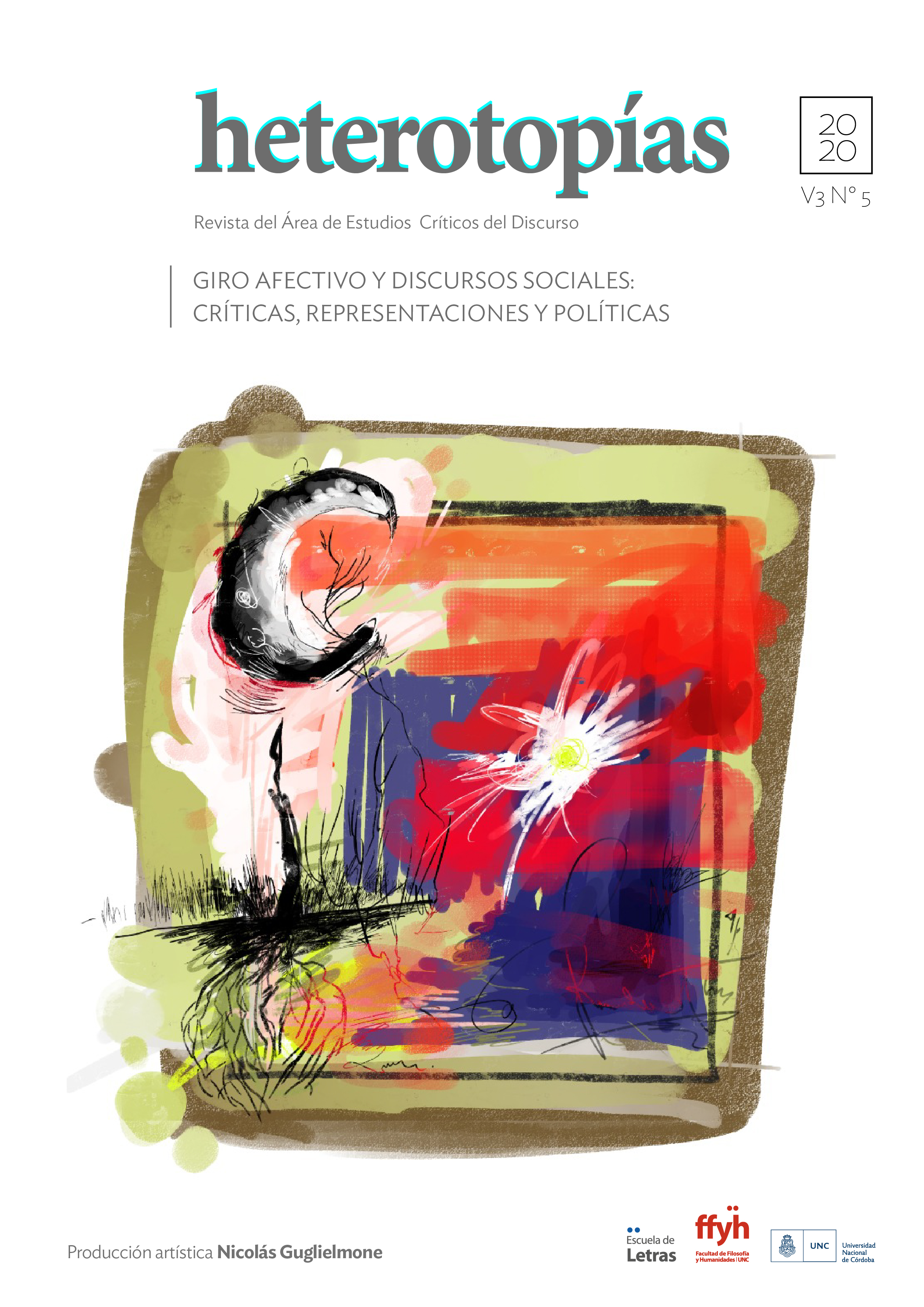Disenchantment narratives To think the limits of care policies
Main Article Content
Abstract
From an English series available on the Netflix platform: After life (Gervais, 2019), which recounts the post-life of a husband after the death of his wife, the effect of cancer. They will see company -as an inevitable social bond- and care, intertwined in a differential way during the mourning process. For that, the mourning expels the protagonist to the limits of heterosexuality.
Grief and disappointment unfold then, not only as affective atmospheres but as political forms from which to question ourselves. This narration will allow us to draw some questions about the construction of feminist care political agendas. In the present work, we intend to inquire about what makes these emotional policies possible. What has survived grief? What makes disappointment possible?
Our bet, from cuir theory and the affective turn, is to propose an opportunity to look-at-ourselves within a normative political articulation of affection and care that often become a conceptual corset.
In this sense, a heterosexual narrative of mourning will provide us with keys to think about our feminisms and problematize the policies around risk or danger and the warning, from the discomfort of the disappoinment that val flores (2019) proposes. How to imagine other care ethics that interrupt the risk metaphor? Is it possible to think of a cuir care ethic?
Downloads
Article Details

This work is licensed under a Creative Commons Attribution-NonCommercial-ShareAlike 4.0 International License.
Those authors who have publications with this journal, accept the following terms: Those authors who have publications with this journal, accept the following terms:
a. The authors will keep their copyright and guarantee to the journal the right of first publication of their work, which will be simultaneously subject to the Creative Commons Attribution - Non-Commercial - Share Alike (by-nc-sa) Attribution License; no commercial use of the original work or any derivative works is allowed, the distribution of which must be done with a license equal to the one that regulates the original work.
b. Authors may adopt other non-exclusive license agreements for the distribution of the published version of the work (e.g., deposit it in an institutional telematic archive or publish it in a monographic volume) provided that the initial publication in this journal is indicated.
c. Authors are allowed and recommended to disseminate their work through the Internet (e.g. in institutional telematic archives or on their website) before and during the submission process, which may lead to interesting exchanges and increase the number of citations of the published work. (See The effect of open access).
How to Cite
References
Ahmed, S. (2015). La política cultural de las emociones. Ciudad de México: Editorial UNAM.
Ahmed, S. (2019). La promesa de la felicidad. Una crítica cultural al imperativo de la alegría. Buenos Aires: Caja Negra.
Butler, J. (2006). Vida precaria. El poder del duelo y la violencia. Buenos Aires: Paidós.
Cavarero, A. (1997). Tu che mi guardi, tu che mi racconti: Filosofia della narrazione. Milan: Feltrinelli.
Cuello, N. y Disalvo, L. (2018). Prólogo: Una posdata sexual sobre las culturas del control. En Cuello, N. y Disalvo, L. (Comps). Críticas sexuales de la razón punitiva (pp. 13-18). Neuquén: Ediciones Precarias.
Cuello, N. (2019). Presentación: El futuro es desilusión. En Ahmed, S. La promesa de la felicidad. Una crítica cultural al imperativo de la alegría (pp. 11-20). Buenos Aires: Caja Negra.
Didi-Huberman, G. (1997). Lo que vemos, lo que nos mira. Buenos Aires: Manantial.
flores, v. (2019). Esparcir la incomodidad. El presente de los feminismos entre la fascinación y el desencanto. Trabajo presentado en Primer encuentro internacional Arte y política en América Latina. Ciudad de México: UNAM.
Gerbais, R. (Prod.) (2019). After Life [Serie de televisión]. Reino Unido: Netflix.
Halberstam, J. (2018). El arte queer del fracaso. Barcelona: Egales.
Haraway, D. (2017). Manifiesto de Especies en Compañía: Perros, gentes y otredad significativa. Córdoba: Bocavulvaria Ediciones.
Haraway, D. (2019) Seguir con el problema. Bilbao: Edición Consonni.
Rubin, G. (2018 [1975]). El tráfico de mujeres. Notas sobre la economía política del sexo. En Rubin, G. En el crepúsculo del brillo. La teoría como justicia erótica (pp. 5-68). Córdoba: Vocavulvaria.
Tronto, J. (1987). Beyond Gender Difference to a Theory of Care. Signs: Journal of Women in Culture and Society, 12, 1-17.
Warner, M., y Berlant, L. (2002). Sexo en público. En Mérida Jiménez, R. (Comp.). Sexualidades transgresoras. Una antología de estudios queer (pp. 229-262). Barcelona: Icaria.
